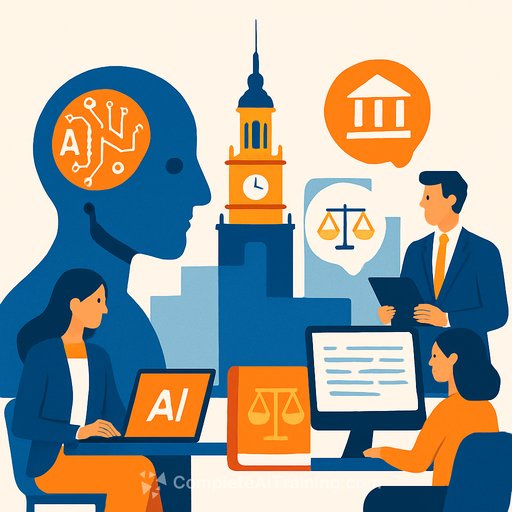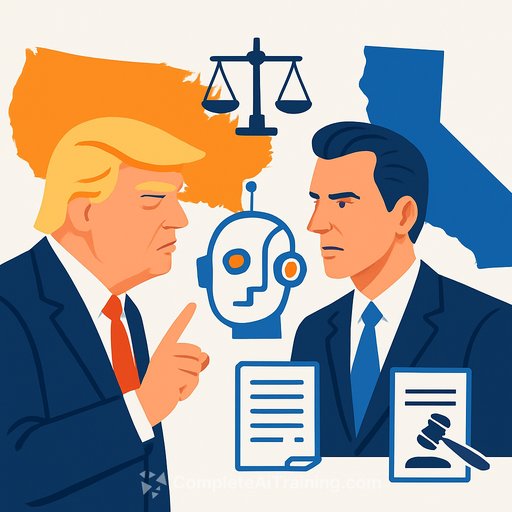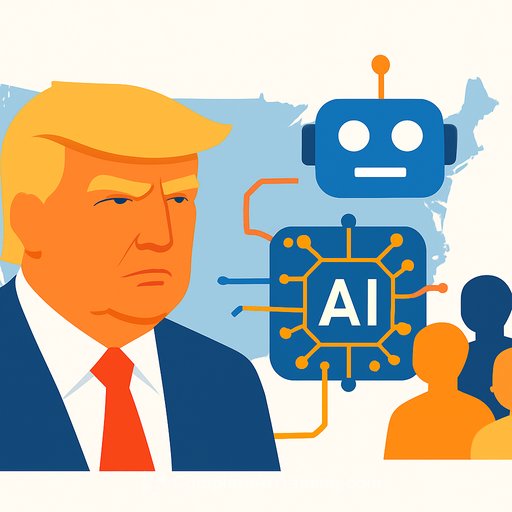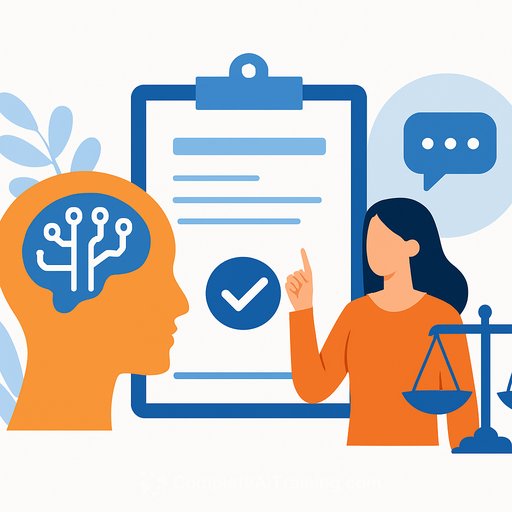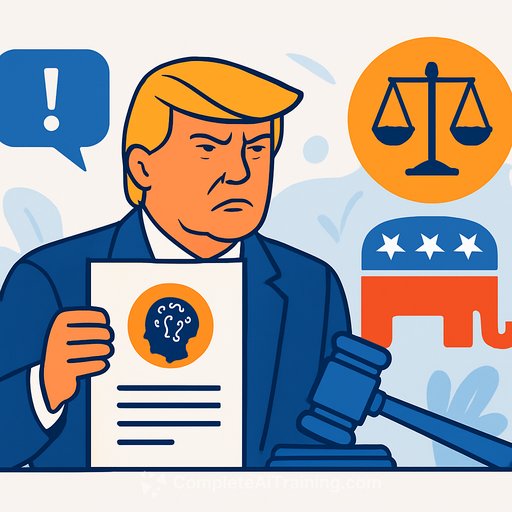Will AI Replace Legal Jobs in Philadelphia? Here’s What to Do in 2025
TL;DR: AI is reshaping legal work in Philadelphia. Thomson Reuters reports 74% of lawyers use AI for research, 57% for document review, freeing around 240 hours per lawyer yearly. Routine tasks face automation, but firms that adopt clear AI strategies, governance, and invest in AI literacy and reskilling will gain new, high-value roles.
How AI Is Already Changing Legal Work in Philadelphia and Pennsylvania
AI tools have become part of daily legal practice in Philadelphia. According to Thomson Reuters (2025), 74% of legal professionals use AI for research and summarization, and 57% use it for document review. This technology can free up nearly 240 hours per lawyer annually—about six workweeks—that can be redirected toward strategic client counseling.
However, adoption varies. Mid-sized firms often use AI tools without formal governance; only about 10% have formal AI policies. The Pennsylvania Joint Formal Opinion (2024-200) emphasizes the need for competence, client consent, and confidentiality when using generative AI. Philadelphia firms should pair AI deployment with policies, supervision, and training to avoid ethical and security risks.
Which Legal Roles in Philadelphia Are Most at Risk – and Which Are Safe
Routine, rule-based tasks such as document review, e-discovery, contract boilerplate drafting, and administrative work are under the most pressure from automation. Some in-house teams expect work to shift back from outside counsel as these tools become more effective.
On the other hand, roles requiring strategic judgment, client counseling, leadership, empathy, and cross-disciplinary problem-solving remain resilient. AI should be used to augment—not replace—critical human judgment. Philadelphia lawyers should automate repetitive tasks while focusing saved time on higher-value advocacy.
Net Job Outlook: Reports, Projections, and What They Mean for Philadelphia
The World Economic Forum’s Future of Jobs Report 2025 forecasts that by 2030, the global job market will add 170 million new jobs while displacing 92 million, for a net gain of approximately 78 million jobs (about 7% growth). This growth is driven by AI, digitalization, and the green transition, with around 39% of key skills changing.
For Philadelphia’s legal market, this means reskilling and role redesign are essential. Firms investing in AI training, building prompt libraries, and redirecting automation gains into high-value counseling will stay competitive.
Essential Human Skills for Philadelphia Lawyers to Develop by 2030
- Analytical thinking and creativity: Solve novel problems effectively.
- Emotional intelligence and persuasion: Build trust in high-stakes situations.
- AI and data literacy: Evaluate AI outputs critically.
- Lifelong learning and adaptability: Prepare for shifting skill requirements.
Philadelphia’s AAA “2030 Vision” podcast highlighted that nearly 40% of core legal skills will shift by 2030. Building practice-specific prompt libraries and collaborating with technologists can lead to better client outcomes. Communication, mediation, and resilience training help convert efficiency gains into deeper client relationships.
Practical Steps Philadelphia Firms and Lawyers Should Take in 2025
- Establish an AI governance committee to oversee AI use.
- Elevate AI strategy to the C-suite to align leadership.
- Run small, fast pilots with verification and client-informed consent.
- Create persona-prompting workshops and prompt-library sprints for reliable outputs.
- Partner with local training resources such as Complete AI Training and Penn Carey Law’s AI programs for staff certification.
- Include non-lawyer technologists as equal partners in AI design.
- Redeploy time saved from automation into distinctive client services.
New Roles and Career Paths Emerging in Philadelphia's Legal Market
Philadelphia is seeing demand for hybrid roles blending legal judgment with technical fluency. Examples include AI compliance officers, legal data scientists, in-house AI counsel, and AI project managers. Some positions offer six-figure salaries and hybrid work schedules.
Local education programs, like Penn Carey Law’s executive course on “Artificial Intelligence, Industry, and the Law,” provide training in liability, privacy, IP, and governance, with CLE credits to certify lawyers for AI-related roles.
Ethics, Oversight, and Data Security Considerations in Pennsylvania
AI use in legal practice is a regulated area. The Pennsylvania Joint Formal Opinion 2024-200 mandates competence, client consent, confidentiality, citation verification, and supervision when using AI tools.
Firms should implement policies requiring human review of AI-generated drafts and maintain auditable prompt libraries to prevent errors or hallucinations that could lead to sanctions. Data security and vendor terms must be carefully managed, with proper documentation of AI tool use per matter.
Case Studies & Local Examples from Philadelphia Institutions
Philadelphia has concrete AI pilots demonstrating practical benefits. For instance, the AAA and NCSC Court Diversion Eligibility Screener is being piloted in Lancaster County to automate preliminary case assessments, reduce docket backlogs, and improve access to justice.
University of Pennsylvania students participate in AI labs and accelerators, creating forecasting and automation tools for industry partners. These examples show how oversight combined with hands-on pilots can generate measurable public and commercial benefits.
Preparing Law Students and Early-Career Lawyers in Philadelphia – Education and Co-op Paths
Drexel Kline offers guaranteed co-op placements where students gain 20–40 hours weekly in real legal environments—law firms, corporate legal teams, courts, and public interest groups. This supervised experience is a practical crash course in applying AI tools responsibly.
Combining co-op or clinic work with focused skill-building—like prompt engineering workshops—helps students and new associates turn AI-driven time savings into strategic client work.
What Clients in Philadelphia Should Expect – And How Firms Can Co-Design AI Solutions
Clients deserve transparency when AI impacts their legal matters. Firms must disclose AI use, explain verification processes, and ensure confidentiality protections. These practices align with Pennsylvania Bar guidance on generative tools and emphasize client-informed consent.
Some firms involve clients in persona-prompting workshops and pilot projects to demonstrate how AI frees lawyer time for strategy. Clear documentation of governance and billing ensures clients trust AI-enhanced services.
Long-Term Business Model Changes and How Philadelphia Firms Can Stay Competitive
Philadelphia firms face changes in office use, pricing models, and AI-driven workflows. Expect continued downsizing of office space and redesign into collaborative environments supporting hybrid work.
Market consolidation means larger firms often command premium rates. Mid-sized firms need to adopt value pricing, alternative fee arrangements, and subscription models to protect margins. Integrating AI into pricing and project management can help unlock the 240 reclaimed hours per lawyer annually.
Conclusion: Will AI Replace Legal Jobs in Philadelphia? The Bottom Line for 2025 in Pennsylvania
AI is reshaping legal work but not killing jobs immediately. Automation targets routine tasks, freeing time for higher-value work. Philadelphia firms that act now—elevating AI strategy to leadership, pairing pilots with oversight, and investing in reskilling—will gain advantage.
Lawyers should focus on AI literacy, human judgment, and cross-disciplinary collaboration. Using persona prompting and supervised pilots ensures reliable outputs. Partnering with local programs turns reclaimed time into measurable client value, not risk.
Ignoring this shift risks falling behind. Leading firms will redefine trusted legal advising in Philadelphia’s courts and boardrooms.
Frequently Asked Questions
- Will AI replace legal jobs in Philadelphia in 2025?
No. AI is reshaping legal work by automating routine tasks. Strategic roles requiring judgment and client interaction remain secure. - Which legal roles are most at risk, and which skills should lawyers develop?
Most at risk: document reviewers, e-discovery specialists, contract boilerplate drafters, administrative staff.
Resilient roles: trusted advisors, litigators, client-facing counselors, hybrid roles.
Skills to develop: AI literacy, analytical creativity, emotional intelligence, adaptability. - What practical steps should Philadelphia firms and lawyers take in 2025?
Establish AI governance; elevate AI strategy to the C-suite; pilot tools with verification; build prompt libraries; partner with local training programs; document AI use and vendor terms; redeploy saved time into client strategy. - How will AI affect job numbers and new roles in Philadelphia's legal market?
Projections forecast net job growth despite displacement. Philadelphia is seeing growth in hybrid AI-law roles with competitive salaries. - What ethical and client-protection measures must lawyers follow when using generative AI?
Ensure competence, obtain client-informed consent, protect confidentiality, verify citations, require human review, and maintain auditable prompt libraries.
Your membership also unlocks:

